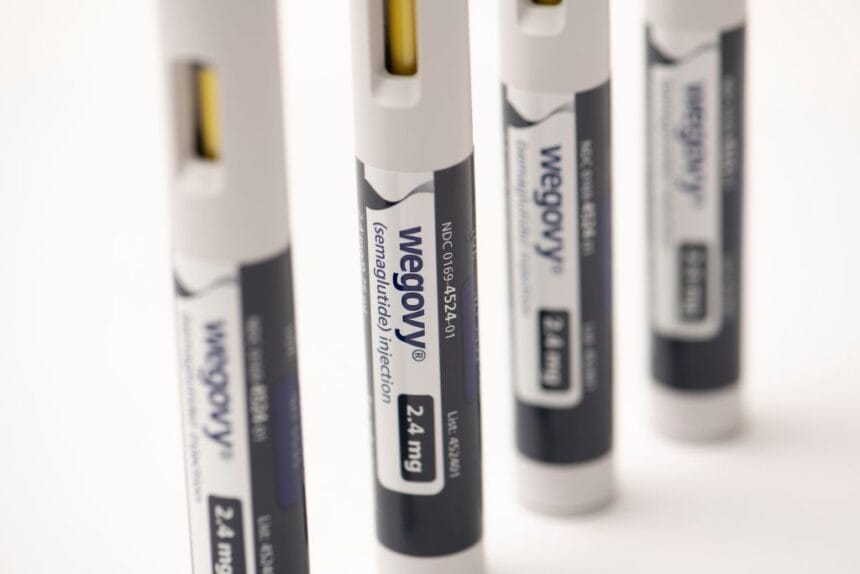Months after releasing data indicating its once-weekly semaglutide 2.4 mg drug significantly cut the risk of major adverse cardiovascular events, Novo Nordisk released additional research over the weekend finding that the drug cut cardiovascular risk by 20%.
The Danish drugmaker unveiled the long-awaited results of its Phase 3 SELECT trial at the American Heart Association (AHA) annual Scientific Sessions in Philadelphia on Saturday, publishing the data simultaneously in the New England Journal of Medicine (NEJM).
The study found that among adults with established cardiovascular disease who were overweight or had obesity but did not have diabetes, weekly semaglutide (known by the brand name Wegovy) cut the risk of major adverse cardiovascular events (MACE) by 20%.
Novo said the risk reduction for MACE was evident in patients soon after they began receiving treatment.
As it relates to secondary endpoints, Novo said the treatment lowered blood pressure among patients as well as cholesterol and blood sugar levels.
‘Instrumental’ in changing obesity treatment
Beyond weight loss, the study suggests that Wegovy can provide meaningful benefits to the heart and that losing pounds may not fully explain the benefits of the drug in terms of reducing the risk of MACE.
Martin Lange, EVP and head of development at Novo Nordisk, said in a statement that the SELECT results will be “instrumental” in changing the way drugmakers and physicians treat obesity going forward.
“These results represent a pivotal moment for people with obesity and the global scientific community as we look ahead to a new era of managing obesity and potentially reducing cardiovascular risks with semaglutide 2.4 mg,” he stated.
This is the latest research attesting to Wegovy’s ability to not only promote weight loss but also positively impact a person’s heart health.
Back in August, the drugmaker presented findings at the European Society of Cardiology Congress and published in NEJM that showed a semaglutide injection resulted in greater weight loss in adults with heart failure with preserved ejection fraction (HFpEF) and obesity.
This came weeks after Novo gave the public its first look at data from the SELECT trial.
With an eye to the future, Novo said it plans to apply for regulatory approval of label expansion for Wegovy in the U.S. and E.U. in the coming months.
Obesity drug battle rages on
Interestingly, one of Novo’s primary rivals is already making progress on the expanded label front.
The SELECT results were announced days after Eli Lilly received an expanded indication from the Food and Drug Administration for tirzepatide to treat obesity. Known as Mounjaro for treating type 2 diabetes, the drug will be known as Zepbound to treat obesity.
Still, Novo is beefing up its operations, announcing late last week that it will invest more than $6 billion to boost production capacity dedicated to manufacturing active pharmaceutical ingredients, including for Wegovy and Ozempic, used to treat diabetes and obesity.
Centering its business operations on providing patients living with obesity and diabetes with Wegovy and Ozempic has been a boon for Novo’s bottom line.
In its latest earnings report, Novo said its operating profit rose 37% at constant exchange rates (CER) while its diabetes and obesity care division sales grew 40% at CER.
Novo recorded a net profit of 61.7 billion Danish kroner thanks to sales of GLP-1 diabetes drugs increasing 49% at CER while obesity care products grew 174%. Going forward, Novo raised its full-year sales outlook to a range of 32% to 38% CER with operating growth to be between 40% to 46%.
Despite the promise of Novo’s study, some industry observers were critical of SELECT’s relative lack of diversity as nearly three-quarters of participants were men and most were white.
Additionally, Eric Topol, founder and director of the Scripps Research Translational Institute, offered a more sober read on the results, writing on X, the social media platform formerly known as Twitter, that an absolute reduction of 1.5 per 100 people in a very high-risk cohort, taking the drug for more than three years at a high price is “not something to write home about.”
He also criticized the media framing of the results, specifically arguing that a headline in Wired didn’t accurately reflect the SELECT trial’s findings.
For a March 2024 article on the CMS expanding access to obesity drugs preventing heart disease, click here.







